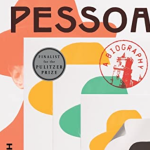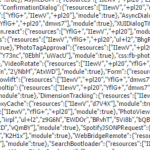writing under constraint
Writing as a life form: A Review of Richard Zenith’s Pessoa: A Biography (2021)

For Fernando Pessoa, as for the roughly 600 texts that make up his Book of Disquiet, and the estimated 136 heteronyms that Pessoa inhabits in his own writing, there "is life, and there is writing, and they must remain immiscible." Richard Zenith's attentive biography of Pessoa succeeds, in the words of Portuguese literary scholar Manuel Portela, in "forming a homogeneous mixture" when all of the names and textual experiences are brought together in a single, biographical narrative.
Better with the Purpose In: or, the Focus of Writing to Reach All of Your Audience

In “Better with the Purpose In: or, the Focus of Writing to Reach All of Your Audience,” Deena Larsen responds in a riPOSTe to Hannah Ackerman’s essay on sound elements in electronic literature, “Better with the Sound On” (ebr October 2021). Larsen approaches Ackerman’s essay from the position of a “dual writer” in exposition and exploration, exploring the question of audience in e-lit, particularly the imagined audience as one that is able-bodied and who may have specific embodied experiences of literature. In order to explore “multiple audiences with the same message,” including by tapping into multiple senses, Larsen draws upon Kate Pullinger’s work Letter to an Unknown Soldier and Amira Hanafi’s A Dictionary of the Revolution.
Better with the Sound On; or, The Singularity of Reading and Writing Under Constraint

With a focus on sound elements in the e-literary, Hannah Ackermans (University of Bergen, Norway) insightfully traces the role of accessibility and (dis)ability in electronic literature. Problematizing the universality of electronic literature practices and rewriting the familiar concepts (such as defamiliarization or constraint), she uses the notion of accessibility as a perspective that both proposes inclusive models of electronic literature and helps to understand creative work on a fundamental, material level.
Creating New Constraints: Toward a Theory of Writing as Digital Translation

In response to Mencia, Pold, and Portela, Belgian poet and scholar Jan Baetans suggests that we might view the field of trans-medial literature as an offshoot of translation studies (and not the reverse). In any case, whether we approach e-lit from a medial or linguistic standpoint, scholars do well to observe a "merger of translation and adaptation studies."
Simultaneously Reading/Writing Under/Destroyed My Life
Maria Damon reviews Alan Sondheim's Writing Under: Selections from the Internet Text in light of the literature of John Fahey to demonstrate that those texts, like her performative review of them, enact a "mastering/dismantling itch twitch" that has a "life of its own, moving through the artist in a parasitic way."